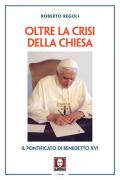Oltre la crisi della Chiesa

Il pontificato di Benedetto XVI
The figure of Benedict XVI has been repeatedly the subject of debate by large sectors of the Catholic world and public opinion, both during his pontificate and then after his renunciation of the active exercise of the Petrine ministry (11 February 2013). Compared to the extensive literature on the subject, this book by Roberto Regoli, far from wanting to be a biography of Joseph Ratzinger, intends to offer the reader a first overview of the history of his work as pope and at the same time suggests some interpretative keys to better illuminate the present and the future of contemporary Catholicism. The years of Benedict XVI appear to be significant today because of the unpredictable way in which they were concluded, but even more so are the questions they have faced: from the implementation of the Second Vatican Council to the ecumenical relations, to the relationship with other religions. The difficult task that Benedict XVI has undertaken has been that of bringing to completion many intuitions matured within the Catholic Church since the Second Vatican Council, systematizing them with precision in an organic thought, capable of interacting with the most felt instances of contemporary culture. His pontificate intended to re-propose to "today's humanity" - marked especially in the West by a profound ideal crisis - the faith in Jesus Christ, seeking at the same time to heal wounds and lacerations that still undermine the unity of the Church. His main concern was not so much the search for consensus as the pursuit of truth. Here is the greatness of his pontificate.